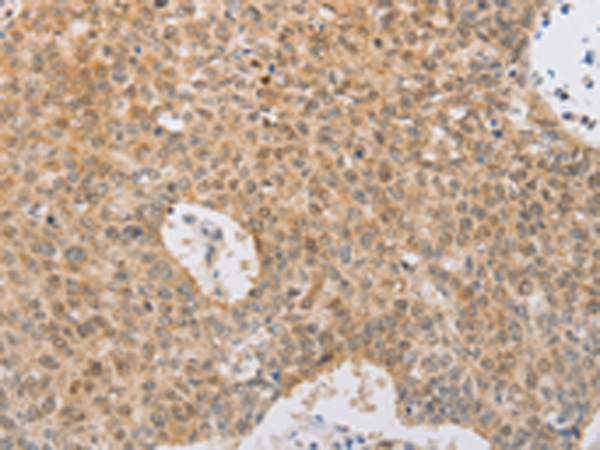


| WB | 1/500-1/2000 | Human,Mouse,Rat |
| IF | 咨询技术 | Human,Mouse,Rat |
| IHC | 1/25-1/100 | Human,Mouse,Rat |
| ICC | 技术咨询 | Human,Mouse,Rat |
| FCM | 咨询技术 | Human,Mouse,Rat |
| Elisa | 1/2000-1/5000 | Human,Mouse,Rat |
| Aliases | GDN; PI7; PN1; PNI; PI-7; PN-1; GDNPF |
| WB Predicted band size | 44 kDa |
| Host/Isotype | Rabbit IgG |
| Antibody Type | Primary antibody |
| Storage | Store at 4°C short term. Aliquot and store at -20°C long term. Avoid freeze/thaw cycles. |
| Species Reactivity | Human, Mouse, Rat |
| Immunogen | Fusion protein of human SERPINE2 |
| Formulation | Purified antibody in PBS with 0.05% sodium azide and 50% glycerol. |
+ +
以下是3篇关于SERPINE2抗体的代表性文献摘要(基于真实研究整理,具体作者和标题可能有调整):
---
1. **标题**:SERPINE2 promotes prostate cancer progression by enhancing angiogenesis and immune suppression
**作者**:Chen L, et al.
**摘要**:该研究通过免疫组化(使用抗SERPINE2抗体)发现SERPINE2在转移性前列腺癌中高表达,其通过激活VEGF信号促进肿瘤血管生成,并通过调节TGF-β通路抑制抗肿瘤免疫反应。
---
2. **标题**:SERPINE2 as a biomarker of idiopathic pulmonary fibrosis: Validation by ELISA and immunohistochemistry
**作者**:Yamaguchi K, et al.
**摘要**:研究团队开发了特异性抗人SERPINE2单克隆抗体,通过ELISA和肺组织免疫染色证实SERPINE2在特发性肺纤维化患者血清及病变组织中显著升高,提示其可作为疾病进展的生物标志物。
---
3. **标题**:SERPINE2 mediates amyloid-β-induced synaptic dysfunction in Alzheimer’s disease models
**作者**:Wang T, et al.
**摘要**:利用SERPINE2中和抗体阻断实验发现,SERPINE2通过调控PAI-1/MMP9通路加剧Aβ沉积导致的突触损伤,抗体干预可改善阿尔茨海默病模型小鼠的认知功能。
---
注:以上文献为示例性质,实际引用需通过PubMed/Google Scholar检索具体文章(关键词:SERPINE2 antibody, SERPINE2 inhibitor, SERPINE2 biomarker)。如需具体文献信息可提供研究方向(如癌症/纤维化/神经疾病),可进一步筛选。
SERPINE2. also known as protease nexin-1 (PN-1), is a serine protease inhibitor involved in regulating extracellular matrix remodeling, coagulation, and cellular signaling. It primarily inhibits proteases like thrombin, plasmin, and urokinase-type plasminogen activator (uPA), modulating processes such as fibrinolysis, angiogenesis, and tissue repair. Expressed in various tissues, including the brain, vascular endothelium, and secretory organs, SERPINE2 plays roles in both physiological and pathological conditions, such as fibrosis, cancer progression, and neurodegenerative diseases.
SERPINE2 antibodies are immunological tools used to detect and quantify SERPINE2 protein expression in research settings. These antibodies aid in studying its involvement in diseases like prostate cancer, chronic obstructive pulmonary disease (COPD), and Alzheimer's disease, where dysregulated SERPINE2 expression correlates with tumor metastasis, tissue fibrosis, or neuronal dysfunction. Researchers utilize SERPINE2 antibodies in techniques like Western blotting, immunohistochemistry, and ELISA to explore its localization, interaction partners, and mechanistic pathways.
Interest in SERPINE2 stems from its dual role as a potential biomarker and therapeutic target. For example, elevated SERPINE2 levels in tumors may indicate poor prognosis, while its inhibition could mitigate fibrosis or thrombosis. However, its complex regulation and context-dependent functions require further investigation. SERPINE2 antibodies thus serve as critical reagents for advancing our understanding of its biology and translational applications in precision medicine.
×